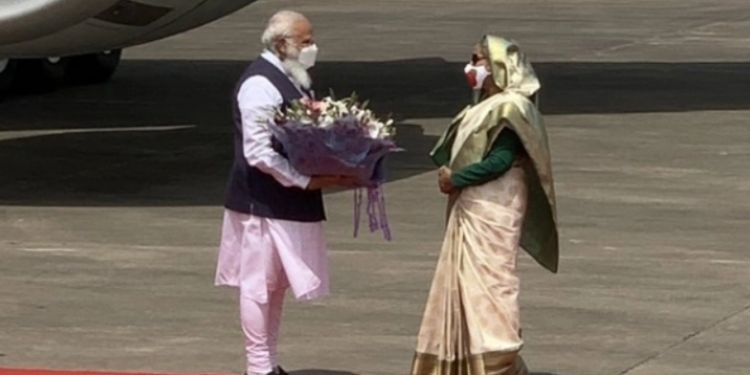The great events of the golden jubilee celebration of the formation of Bangladesh and the birth centenary of the nation’s architect, Sheikh Mujibur Rahman, have needlessly got mired in a controversy. This happened due to a statement by Indian Prime Minister Narendra Modi in Dhaka during his two-day visit which began March 26. Modi claimed for himself some contribution to the birth of the country asserting he had been jailed in 1971 for participating in a “satyagraha” in support of Bangladesh, then struggling to be born.
The assertion has been widely greeted with derision as this is the first time that the people have come to know that a 21-year-old obscure man, Narendra Modi, also contributed in some way to the struggle of the Mukti Bahini. This is indeed a pathetic attempt to become part of a glorious chapter of India’s post-independence history in which he had no role worth the name.
The facts are known to all. The Kalurghat Radio Station in Chittagong announced on March 27, 1971 the ‘Independence of Bangladesh’ following the declaration of martial law in East Pakistan even after the Awami League, based in East Pakistan, had won a majority in Pakistan’s general election. Sheikh Mujibur Rahman had already been arrested in Dhaka on the midnight between March 24 and March 25, 1971 and flown to prison in Rawalpindi in April. The Pakistan army then carried out systematic mass killings, while thousands of Bangla women trying to flee the country were raped.
India’s then Prime Minister Indira Gandhi moved a resolution in Parliament expressing “whole hearted sympathy and support for the people of East Bengal”. It deliberately stopped short of recognising the ‘declaration of independence of Bangladesh’ as it would have had international ramifications with the USA and China then taking sides with Pakistan. The PM had already taken the principal Opposition leaders into confidence holding a meeting with them on March 26, 1971 where she discussed the limited options available to India. Recorded history tells us she explained India could not afford to make public its actions in response to the unfolding situation in East Pakistan since these would not have got international support because Pakistan was a sovereign member of the United Nations.
What happened thereafter is history. India provided material, military and moral support to the people of East Pakistan. Brave Indian soldiers trained the liberation force, Mukti Bahini and fought Pakistan army disguising themselves as Mukti Bahini warriors.
However, the Indian government delayed conferring formal recognition on the Provisional Government of Bangladesh as that would have been considered an act of war by Pakistan. Instead, it sought to buy time to make proper war plans and insulate Sheikh Mujibur, in West Pakistan, from treason charges and the execution of a death sentence. At the same time it allowed the Provisional Government of Bangladesh to operate under its protection from Calcutta. It also gave shelter to about six million East Bengali refugees, including Mukti Bahini fighters, who crossed over to West Bengal.
The Indian government enlisted the support of the USSR by way of signing the India-USSR treaty of Friendship. This cushioned India against any actions from the USA and China. The US ploy was to push the region into war helping its strategic ally, Pakistan, to score over India. This was the reason why it tried to mobilise public opinion in India against the government’s delay in according official recognition to the provisional government of Bangladesh.
The satyagraha in which Modi said he had participated along with supporters of the Jan Sangh, which was the BJP’s previous avatar, was for demanding such recognition that would have spoiled all the efforts of India to help the formation of Bangladesh. The Jan Sangh, the RSS, and its leaders, particularly Atal Bihari Vajpayee, were clamouring for an early commencement of hostilities. It would be naive to believe that they did not know the consequences of such action.
The dismemberment of Pakistan and the creation of Bangladesh have been touted by the Congress as one of the biggest achievements of the Indira Gandhi government. It also gave a new lease of life to the Congress party. The BJP’s anti-Pakistan policy – a key element of its polarisation politics to garner majority Hindoo votes – pales into insignificance when compared to the Indira government’s role in the dismemberment of Pakistan and formation of Bangladesh. The surgical strike at Balakot although projected by the BJP as a step no less significant than the dismemberment of Pakistan is, in reality, nothing close to 1971.
The PM in his Dhaka speech didn’t use a single word in praise of the Indira government for the creation of Bangladesh. On the contrary, he sought to claim credit for himself when what he had done as a young saffron parivar activist ran counter to the objectives of India and the nascent state of Bangladesh.
History does not allow itself to be perverted altogether. Especially modern and recorded history cannot be tinkered with.







































